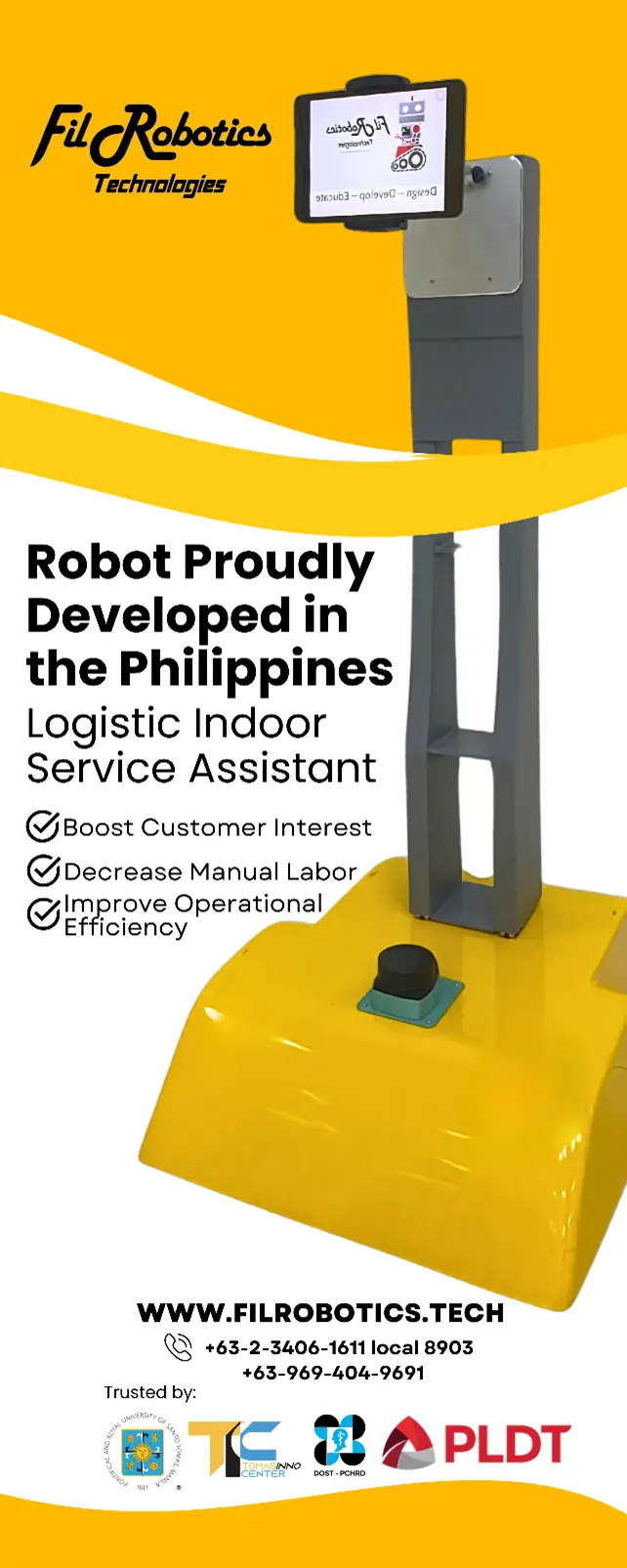HeaRTNovation
LISA Robot – A Logistics Indoor Service Assistant Robot for Hospital Applications
TECHNOLOGY GENERATOR
University of Santo Tomas
Anthony James C. Bautista, PME, MBA, PhD
THE PROBLEM
Healthcare facilities in the Philippines continue to struggle in delivering patient care effectively due to the growing shortage of healthcare workers, and it has been exacerbated by COVID-19 pandemic. The distribution and management of patient care activities and hospital logistics have both been considerably impacted by the growing scarcity of the workforce. Estimates from 2022 show that the ideal nurse-to-patient ratio is 1:12. The Philippine Daily Inquirer published an editorial article which revealed that in reality, the majority of Filipino nurses care for 20 to 50 patients during a 12-hour shift. The quality of patient care will likely worsen if an excessive nurse-to-patient ratio continues, in addition to a steady rise in the turnover rate of nurses. The demand for technology support has grown due to the increased time and energy demands placed on healthcare personnel.
THE SOLUTION
 The LISA Robot (Logistics Indoor Service Assistant Robot) is an autonomous service robot designed to improve operational efficiency in healthcare environments by automating routine logistics tasks. Equipped with advanced navigation systems, LISA can autonomously deliver medical supplies, transport equipment, and assist with disinfection and sterilization procedures within hospitals. Its telepresence functionality allows healthcare professionals to remotely conduct patient checkups and rounds, reducing the risk of infection transmission. The LISA Robot enhances resource allocation, enabling healthcare workers to focus more on patient care, thereby addressing staffing shortages and improving overall hospital service delivery. LISA Robot offers autonomous navigation, telepresence function, and logistics and task automation, with customizable and adaptable design, affordability, localized after-sales support.
The LISA Robot (Logistics Indoor Service Assistant Robot) is an autonomous service robot designed to improve operational efficiency in healthcare environments by automating routine logistics tasks. Equipped with advanced navigation systems, LISA can autonomously deliver medical supplies, transport equipment, and assist with disinfection and sterilization procedures within hospitals. Its telepresence functionality allows healthcare professionals to remotely conduct patient checkups and rounds, reducing the risk of infection transmission. The LISA Robot enhances resource allocation, enabling healthcare workers to focus more on patient care, thereby addressing staffing shortages and improving overall hospital service delivery. LISA Robot offers autonomous navigation, telepresence function, and logistics and task automation, with customizable and adaptable design, affordability, localized after-sales support.
In a market dominated by foreign-made robots, the LISA Robot stands out for its local origin, allowing it to better cater to the specific needs and challenges faced by Filipino businesses. It allows the consumer to customize the robot to meet unique requirements, may it be for hospitals, hotels, or other service-oriented organizations.
LISA Robot won 3rd Prize for the Outstanding Creative Research (Likha) Award during the 2023 Regional Invention Contest and Exhibits. It is also a finalist of the Benita and Catalino Yap Foundation BCYF Innovation Awards, and the 2023 Alfredo M. Yao Intellectual Property Awards.
LISA Robot is developed by a team of researchers from the University of Santo Tomas in the leadership of Dr. Anthony James Bautista, through the funding support of the Department of Science and Technology – Philippine Council for Health Research and Development.
TECHNOLOGY DEVELOPMENT STATUS
The LISA Robot is currently at Technology Readiness Level 7, meaning it has been demonstrated in an operational environment. The prototype has undergone successful testing in relevant service settings, such as hospitals and school facilities, showcasing its ability to autonomously perform service tasks like equipment delivery, room service, and general assistance with minimal human intervention.
Although the LISA Robot is not intended for direct medical use, pilot tests are being conducted in healthcare environments such as hospitals to evaluate its performance in tasks like equipment transportation and non-clinical patient support. The intellectual property for the LISA Robot is patent-pending.
MARKET VIABILITY
LISA Robot is already at Investment Readiness Level (IRL) 8. At this stage, the technology has developed a high-fidelity minimum viable product (MVP) and validated value delivery, ensuring that the product meets customer needs and provides tangible benefits. Moving forward, LISA is focused on refining its business model, ensuring profitability, and proving its viability to potential investors. The healthcare industry, including hospitals, clinics, and rehabilitation centers, represents a key target audience for the LISA Robot. These entities can greatly benefit from the key features of the LISA Robot.
The entry-level selling price of the LISA Robot is $2,745.87, or approximately ₱158,847.00, making it significantly more affordable compared to its local and foreign competitors. Price may vary depending on the customization of the robot for inclusion of more complex application requiring specialized navigation, enhanced security protocols, or advanced task management.
CURRENT NEEDS
The research team is actively seeking partnerships with manufacturers and distributors who can enhance automation in service sectors. Collaboration with manufacturers is mainly for high-quality production, while distributors can facilitate wider market reach and effective sales channels. In addition, the team is seeking to establish relationships with local and international partners with the expertise, resources, and networks to help drive the adoption of the LISA Robot across various industries. The team envisions to facilitate this through needs assessment, pilot-testing, training and support, and feedback and improvement for full deployment.
CONTACT DETAILS
Company Name: Filrobotics Technologies Inc.
Address: TOMASInno Center
Ground Floor, Blessed Pier Giorgio Frassati Building
University of Santo Tomas España Boulevard, Sampaloc, Manila 1000, Philippines
Landline: +63-2-3406-1611 local 8903
Mobile: +63 969 404 9691
Email: filroboticsnow@gmail.com
Website: filrobotics.tech




